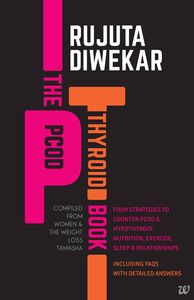 Rujuta Diwekar | Dabboo Ratnani
Rujuta Diwekar | Dabboo Ratnani
Interview/ Rujuta Diwekar, author and dietician
Reading Rujuta Diwekar’s books is like listening to your grandmother. The award-winning dietician and author of bestseller Don’t Lose Your Mind, Lose Your Weight is an advocate of common sense eating, with a focus on local, traditional cuisine. In her new book, The PCOD And Thyroid Book, Diwekar says that the rise of infertility and hormonal problems in women is because they are not listening to their bodies. To solve these issues, switch off gadgets and encourage girls to play outside longer, she emphasises in an interview.
Why is the incidence of PCOD (Poly Cystic Ovarian Disease) in girls and young women increasing?
I call it the three S problem: sitting, stress and smart phone. It has become the bane of our existence. The solution doesn't lie in losing weight quickly, but in adopting long-lasting, sustainable lifestyle changes.
You have said that many times PCOD doesn't get detected until women try to get pregnant. Are there no symptoms?
There is a silent acceptance of pain, break-outs (of pimples) and bad moods before and during one's periods. Once we understand that this isn't normal and is a consequence of an absence of good nutrition and adequate exercise, we can tackle it head on. Like someone wise once said: it's about changing what can be changed. The monthly period is accepted as part of biology. Pain, however, is not biology. It's a lifestyle issue—one that can be easily fixed with awareness towards a healthier lifestyle.
You have given instances of girls being given oral contraceptives which made them moody and irritable; they didn't even know what they were taking. Are doctors over-medicating? Shouldn't they advocate lifestyle changes before prescribing medicines?
I am all for doctors advocating a change in lifestyle because they have a huge influence over patients. Their words matter, therefore they must use the right words. Words that spread awareness, not fear of future diseases or complications. In every field, there are some people who are aggressive in their approach, and others who are more conservative. Though India is notorious for overuse of medication, there are doctors who are willing to walk the middle ground; to give you a patient ear and prod you to exercise and eat right. As patients, this is the variety we should seek, not the ones who write prescriptions without even two minutes of interaction with the patient on [the app] FaceTime.
The thyroid gland has been blamed for many things, especially weight gain. You say that weight gain is not the only side-effect of hypothyroidism. What are the others?
Snoozing your alarm even while fully intending to wake up at the first ring, paying for the full year at the gym but being unable to sustain it even for a month, taking up more work than what is realistically possible, and needing multiple cups of tea and coffee to get through the day, are just some of them. Each one makes us look bad in our own eyes and, in that sense, is infinitely worse than weight gain.
You recommend frequent meals through the day. For many people, however, that might not be practical.
You can always grab a fruit, sherbet and some nuts, which makes it more than three meals. It isn't really back-breaking to look out for yourself. It's important to change one's mind more than one's eating habits.
What are some of the Indian super foods?
The staples in our diets are the super foods. In a diverse country like ours, we must strive to achieve diversity in our diet so that not just the health of our bodies, but those of our local economies, too, improve and, in turn, help the global ecology. We should not be giving up our poha, dosa and parantha for a bowl of oats.
You say there is nothing wrong in eating white rice or carbohydrates. But the Indian diet has been criticised for having large amounts of carbohydrates which, along with a sedentary lifestyle, has led to an increase in obesity.
Thinking of rice as carbohydrate is to overlook the way rice is consumed here; with pulses, ghee, meat, curries and yoghurt. We have perfected our rice meal combos to make them not just delicious, but also low to medium on glycaemic index. And, truth be told, if we have cities with no footpaths or pedestrian rights, you can give up all the carbohydrate, protein and fat that you want, and we will still be a diabetic nation. Obesity and diseases are not just an individual problem, it is also a policy issue.
You have rightly pointed out that girls stop being physically active much earlier than boys and this affects their health. What can we do to change this?
Make it cool for girls to be fit and strong. Create open spaces where every gender, class and age group can safely sweat it out. We must raise our girls with a mindset of acceptance—acceptance of our own bodies to begin with.

Could you list some ways to get the most nutrients from our food?
- Eat more at home
- Eat what is in season
- Buy food from smaller mar kets instead of large malls
- Get to know the person who is growing your food, or at least your vegetable seller
- Switch off your gadget while eating
- Exercise and move around as part of a routine, not as a means of losing weight
Are people now better informed about healthy living and adopting a holistic diet and healthy lifestyle instead of only focusing on fad diets and weight loss?
Yes, and it is exactly this trend that keeps me in business. I am ever so grateful for this increased awareness and kindness towards the body.






